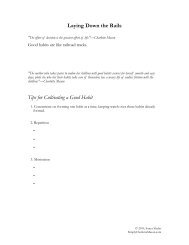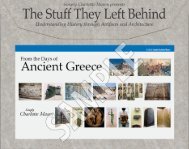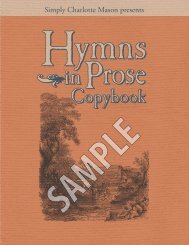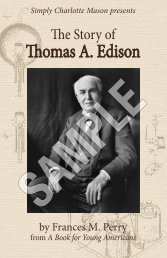Laying Down the Rails for Children - Simply Charlotte Mason
Laying Down the Rails for Children - Simply Charlotte Mason
Laying Down the Rails for Children - Simply Charlotte Mason
Create successful ePaper yourself
Turn your PDF publications into a flip-book with our unique Google optimized e-Paper software.
Decency and Propriety Habits<br />
The Soldiers in <strong>the</strong> Snow<br />
adapted from A Book of Golden Deeds by <strong>Charlotte</strong> M. Yonge<br />
Notes<br />
Few generals had ever been more loved by <strong>the</strong>ir soldiers than <strong>the</strong> great Viscount<br />
de Turenne, who was Marshal of France in <strong>the</strong> time of Louis XIV. Troops are always<br />
proud of a leader who wins victories; but Turenne was far more loved <strong>for</strong> his generous<br />
kindness than <strong>for</strong> his successes. If he gained a battle, he always wrote in his despatches,<br />
‘We succeeded,’ so as to give <strong>the</strong> credit to <strong>the</strong> rest of <strong>the</strong> army; but if he were defeated,<br />
he wrote, ‘I lost,’ so as to take all <strong>the</strong> blame upon himself. He always shared as much as<br />
possible in every hardship suffered by his men, and <strong>the</strong>y trusted him entirely. In <strong>the</strong> year<br />
1672, Turenne and his army were sent to make war upon <strong>the</strong> Elector Frederick William<br />
of Brandenburg, in Nor<strong>the</strong>rn Germany. It was in <strong>the</strong> depth of winter, and <strong>the</strong> marches<br />
through <strong>the</strong> heavy roads were very trying and wearisome; but <strong>the</strong> soldiers endured all<br />
cheerfully <strong>for</strong> his sake. Once when <strong>the</strong>y were wading though a deep morass, some of <strong>the</strong><br />
younger soldiers complained; but <strong>the</strong> elder ones answered, ‘Depend upon it, Turenne<br />
is more concerned than we are. At this moment he is thinking how to deliver us. He<br />
watches <strong>for</strong> us while we sleep. He is our fa<strong>the</strong>r. It is plain that you are but young.’<br />
Ano<strong>the</strong>r night, when he was going <strong>the</strong> round of <strong>the</strong> camp, he overheard some of <strong>the</strong><br />
younger men murmuring at <strong>the</strong> discom<strong>for</strong>ts of <strong>the</strong> march; when an old soldier, newly<br />
recovered from a severe wound, said: ‘You do not know our fa<strong>the</strong>r. He would not have<br />
made us go through such fatigue, unless he had some great end in view, which we cannot<br />
yet make out.’ Turenne always declared that nothing had ever given him more pleasure<br />
than this conversation.<br />
There was a severe sickness among <strong>the</strong> troops, and he went about among <strong>the</strong><br />
sufferers, com<strong>for</strong>ting <strong>the</strong>m, and seeing that <strong>the</strong>ir wants were supplied. When he passed<br />
by, <strong>the</strong> soldiers came out of <strong>the</strong>ir tents to look at him, and say, ‘Our fa<strong>the</strong>r is in good<br />
health: we have nothing to fear.’<br />
The army had to enter <strong>the</strong> principality of Halberstadt, <strong>the</strong> way to which lay over<br />
ridges of high hills with narrow defiles between <strong>the</strong>m. Considerable time was required<br />
<strong>for</strong> <strong>the</strong> whole of <strong>the</strong> troops to march through a single narrow outlet; and one very cold<br />
day, when such a passage was taking place, <strong>the</strong> Marshal quite spent with fatigue, sat<br />
down under a bush to wait till all had marched by, and fell asleep. When he awoke, it<br />
was snowing fast; but he found himself under a sort of tent made of soldiers’ cloaks,<br />
hung up upon <strong>the</strong> branches of trees planted in <strong>the</strong> ground, and round it were standing,<br />
in <strong>the</strong> cold and snow, all unsheltered, a party of soldiers. Turenne called out to <strong>the</strong>m, to<br />
ask what <strong>the</strong>y were doing <strong>the</strong>re. ‘We are taking care of our fa<strong>the</strong>r,’ <strong>the</strong>y said; ‘that is our<br />
chief concern.’ The general, to keep up discipline, seems to have scolded <strong>the</strong>m a little<br />
<strong>for</strong> straggling from <strong>the</strong>ir regiment; but he was much affected and gratified by this sight<br />
of <strong>the</strong>ir hearty love <strong>for</strong> him.<br />
Heroes of <strong>the</strong> Plague<br />
adapted from A Book of Golden Deeds by <strong>Charlotte</strong> M. Yonge<br />
When our Litany entreats that we may be delivered from ‘plague, pestilence, and<br />
famine’, <strong>the</strong> first of <strong>the</strong>se words bears a special meaning, which came home with strong<br />
and painful <strong>for</strong>ce to European minds at <strong>the</strong> time <strong>the</strong> Prayer Book was translated, and <strong>for</strong><br />
<strong>the</strong> whole following century.<br />
It refers to <strong>the</strong> deadly sickness emphatically called ‘<strong>the</strong> plague’, a typhoid fever<br />
exceedingly violent and rapid, and accompanied with a frightful swelling ei<strong>the</strong>r under<br />
<strong>the</strong> arm or on <strong>the</strong> corresponding part of <strong>the</strong> thigh. The East is <strong>the</strong> usual haunt of this<br />
fatal complaint, which some suppose to be bred by <strong>the</strong> marshy, unwholesome state<br />
<strong>Simply</strong><strong>Charlotte</strong><strong>Mason</strong>.com 43
















